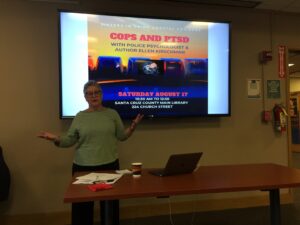PTSD in First Responders
by Victoria Kazarian

First responders feel they have to be problem solvers who won’t crack under pressure—vigilant protectors who can see the most gruesome sights and remain calm and in control.
The problem is, according to police psychologist Ellen Kirschman, this is not realistic. When first responders turn off their emotions, it’s hard to turn them back on. The result can be PTSD, or as Ellen calls it, PTSI—Post Traumatic Stress Injury. “It’s actually PTSI,” Ellen says, “because it is an injury and it can heal.”
The hidden stress a cop carries can cause misunderstandings for an officer’s family, who don’t see the scope of challenges a cop faces in the line of duty. A cop confronts aspects of life most people would rather not know exist: child abuse, sexual abuse, homicide. The cop doesn’t always feel comfortable sharing this with civilians and family.
Cops also come face to face with their own limitations. Many times cops go out on a call that is “screwed from the beginning,” and tragedy is unavoidable. Officers on the scene may start second-guessing their actions, wondering what they could have done to fix the situation. If another officer was killed or injured in a call, the fellow officer may blame himself for not providing sufficient support.
There are also times when a cop feels betrayed by the police organization itself, thinking that superiors are throwing them under the bus. They don’t feel supported or validated in their job and the actions they’ve taken. This betrayal can be shattering. “You expect the bad guys to hurt you, but not your own organization,” Ellen says.
For an officer who has been shoving aside emotions to stay “in control,” these stresses can lead to a number of outcomes: drinking, extramarital affairs, anxiety, memory issues, aggression, and problems with performance on the job.
In her work, Ellen describes seeing traumatic on-duty events bring up painful episodes in an officer’s childhood. One cop realized he had been triggered on duty by an abandonment issue, which brought back memories of a time his parents had left him on his own as a child for a year.
Based on her years of experience as a police psychologist, Dr. Kirschman wrote I Love a Cop, to help families understand the psychological pressures a cop faces in the line of duty. She followed this up with I Love a Fire Fighter, and Counseling Cops: What a Clinician Needs to Know. She also runs retreats to provide assistance for first responders dealing with PTSI.
In addition to her three nonfiction books, Dr. Kirschman now writes a suspense series with fictional police psychologist Dr. Dot Meyerhoff. “I thought fiction would be easy, because you’re making things up,” she says. “It’s actually a lot harder.”
Victoria Kazarian is the Communications Coordinator for the Coastal Cruisers chapter. A first-place winner and finalist in the Central Coast Writers short story contests, she is now fine-tuning her second mystery novel, set in Silicon Valley’s aerospace industry. She teaches high school English and creative writing.